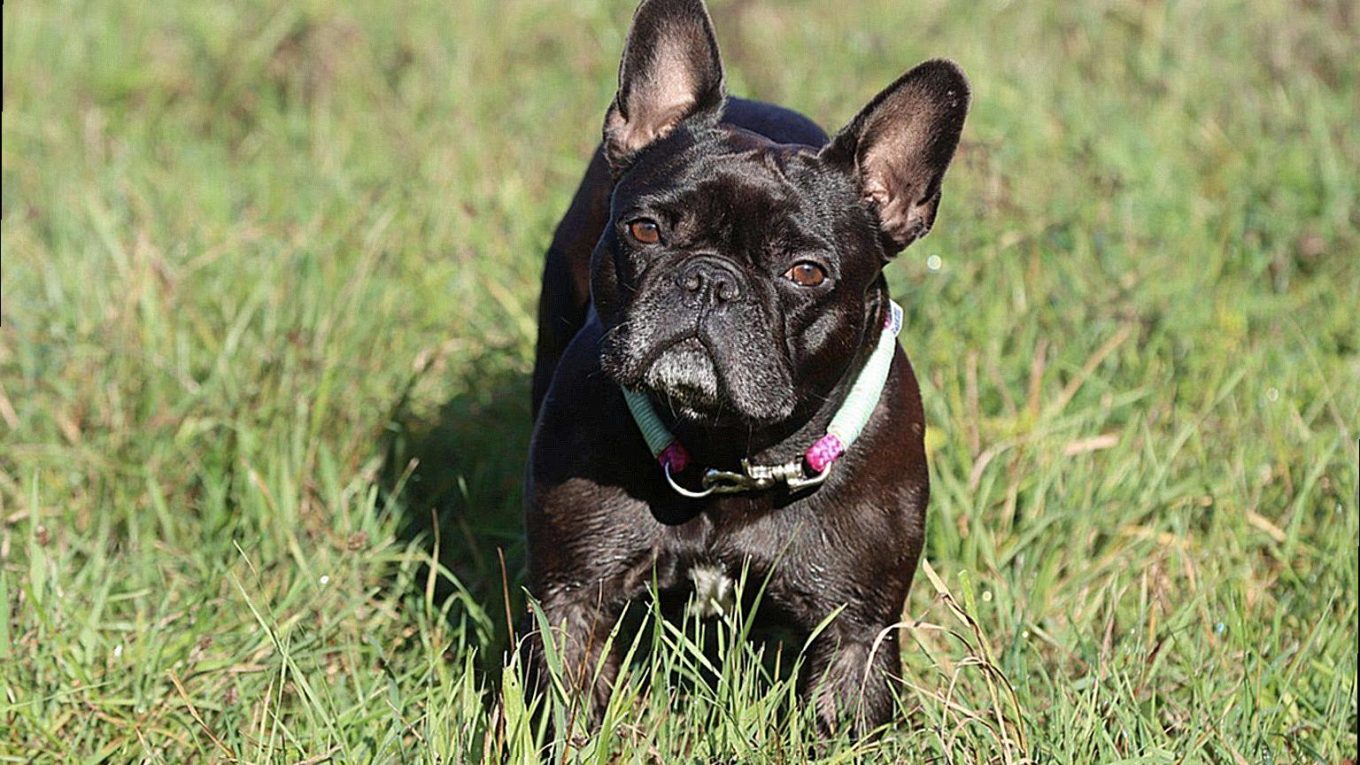Are French Bulldogs a result of inbreeding?
Hey there, welcome to our blog post all about those lovable little creatures known as French Bulldogs.
You know the ones – with their squishy faces and playful personalities that can melt even the coldest of hearts. But here’s the thing: there’s been a lot of talk lately about whether these cuties are the result of inbreeding.
So, we decided to dig deep into the history of this breed, uncovering the truth behind their genetic makeup and how it may have affected their health and behavior. Now, you might think you know everything there is to know about French Bulldogs, but trust us when we say there’s more to this story than meets the eye.
So, buckle up and get ready for a wild ride as we unravel the mysteries surrounding French Bulldogs and their tangled genetic journey.
The History of French Bulldogs and Inbreeding Practices
Contents
- 1 The History of French Bulldogs and Inbreeding Practices
- 2 Genetic Health Risks Associated with French Bulldogs
- 3 Understanding the Role of Brachycephalic Anatomy in French Bulldogs
- 4 Responsible Breeding Practices for French Bulldogs
- 5 The Impact of Excessive Inbreeding on French Bulldog Health
- 6 Adopting from Reputable Breeders or Rescue Organizations
- 7 Promoting Responsible Breeding Practices to Improve Genetic Diversity
- 8 Educating Potential Owners about the Health Risks of Inbreeding
- 9 Conclusion
In this blog post, we will delve into the intriguing history of French Bulldogs and shed light on the importance of responsible breeding practices to ensure the health and well-being of these beloved pets.
The Origins of French Bulldogs:
The story of French Bulldogs begins in the 1800s in England, where breeders aimed to create a smaller version of the English Bulldog. These early efforts resulted in a breed known as “Toy Bulldogs.” However, it was when lace workers from Nottingham migrated to France during the Industrial Revolution that the breed truly flourished.
French Development and Distinctive Traits:
In France, the Toy Bulldogs were further refined and developed, acquiring their unique characteristics that we know and love today. Breeders in France focused on selecting dogs with specific traits such as a compact body, large head, and those adorable bat-like ears that set French Bulldogs apart from other breeds.
Inbreeding Practices:
During the early development of French Bulldogs, inbreeding practices were commonly employed to establish a breed standard. Inbreeding involves mating closely related individuals to preserve desired traits. While these practices helped solidify French Bulldogs’ distinctive appearance and temperament, they also brought about potential health risks due to reduced genetic diversity.
Health Challenges Associated with Inbreeding:
Excessive inbreeding can result in various health issues and genetic disorders. Unfortunately, French Bulldogs are not exempt from these concerns. Some common health problems associated with inbreeding in French Bulldogs include respiratory issues, skin allergies, eye problems, and skeletal abnormalities. It is essential for owners to be aware of these potential health risks when considering adding a French Bulldog to their family.
The Importance of Responsible Breeding:
Thankfully, responsible breeders are now focusing on outcrossing or introducing new bloodlines to mitigate the consequences of excessive inbreeding. By diversifying the gene pool, breeders aim to improve the overall health and vitality of French Bulldogs while preserving their unique characteristics.
Choosing a Responsible Breeder:
When looking for a French Bulldog, it is crucial to do your research and choose a responsible breeder who prioritizes the health and well-being of their dogs. Reputable breeders conduct health testing on their breeding dogs to minimize the risk of inherited health issues. They also emphasize genetic diversity and proper care for their puppies.
Genetic Health Risks Associated with French Bulldogs
It is essential for owners and breeders to be aware of the genetic health risks that can affect these adorable companions. Many of these health issues can be attributed to the practice of inbreeding, which has been commonly used to maintain certain physical traits in the breed.

Brachycephalic Airway Syndrome
One of the most prominent genetic health risks associated with French Bulldogs is brachycephalic airway syndrome. This condition is characterized by a shortened skull shape, resulting in narrowed airways. As a result, French Bulldogs can experience breathing difficulties and respiratory distress. The risk of this syndrome is further increased by their relatively large tongues and narrow nostrils.
Patellar Luxation
Another common genetic health risk in French Bulldogs is patellar luxation, which refers to the displacement of the kneecap. This condition can cause pain, lameness, and difficulty walking. It occurs when the alignment of the bones in the hind legs is not optimal, leading to instability in the knee joint.
Eye Problems
French Bulldogs are also prone to various eye problems. Cherry eye, which is the prolapse of the third eyelid gland, is a common issue seen in this breed. Additionally, French Bulldogs are at an increased risk of developing cataracts, which can cause vision impairment, and progressive retinal atrophy, a degenerative condition that affects the retina.

Skin Conditions
Due to their sensitive skin and susceptibility to environmental irritants, French Bulldogs are prone to developing skin conditions such as allergies and dermatitis. These conditions can cause itchiness, redness, and discomfort for the dog.
Other Genetic Diseases
In addition to the above-mentioned health risks, French Bulldogs have a higher likelihood of developing other genetic diseases. This includes hip dysplasia, a condition where the hip joint doesn’t develop properly and can lead to pain and mobility issues. Heart defects, such as mitral valve disease, are also more prevalent in this breed. Finally, French Bulldogs are known to have a higher risk of certain types of cancer, including mast cell tumors and lymphoma.
Prevention and Management
To minimize the impact of these genetic health risks, responsible breeding practices are crucial. This includes avoiding excessive inbreeding and conducting health screenings before breeding to ensure that only healthy individuals are used for reproduction. Regular veterinary check-ups, proper nutrition, regular exercise, and maintaining a healthy weight are also essential for the overall well-being of French Bulldogs.
Understanding the Role of Brachycephalic Anatomy in French Bulldogs
You may have noticed that their unique flat faces, shortened muzzles, and pushed-in noses set them apart from other breeds. But have you ever wondered why French Bulldogs have these distinctive features? Well, it all comes down to selective breeding practices and, yes, a little bit of inbreeding.
Let’s talk about inbreeding for a moment. Inbreeding involves mating closely related individuals to maintain specific traits within a breed. In the case of French Bulldogs, breeders have used this practice to accentuate their adorable physical features. However, this has come at a cost to their health and well-being.
The main issue associated with brachycephalic anatomy is a condition called brachycephalic obstructive airway syndrome (BOAS). Imagine trying to breathe through a straw – that’s how French Bulldogs with BOAS feel. Their narrowed airway passage makes it harder for them to breathe properly, leading to symptoms like difficulty breathing, snoring, wheezing, and exercise intolerance.
But that’s not all. French Bulldogs with brachycephalic anatomy are also prone to other health problems. Heat intolerance is a big one – their shortened muzzles make it challenging for them to cool down efficiently. Dental problems, eye conditions, and skin fold infections are also commonly seen due to their unique facial structure.
So, what can we do as responsible breeders and owners to ensure the well-being of our Frenchies? Here are some tips:
- Prioritize genetic diversity: Avoid excessive inbreeding and focus on maintaining a diverse gene pool. This can help reduce the severity of brachycephalic anatomy and associated health issues.
- Improve overall health and functionality: Breeding for healthier traits, such as a slightly longer muzzle or wider airway passage, can help alleviate some of the breathing difficulties faced by French Bulldogs.
- Provide a suitable environment: Make sure your Frenchie has access to a cool and well-ventilated space, especially during hot weather. Avoid strenuous exercise in extreme temperatures to prevent heat-related issues.
- Regular exercise: Although French Bulldogs may not be the most athletic breed, regular exercise is essential to keep them fit and maintain a healthy weight. Just make sure not to overexert them, especially in hot weather.
- Proper veterinary care: Regular check-ups with a veterinarian who is familiar with brachycephalic breeds are crucial. They can monitor your Frenchie’s health, address any concerns, and provide preventative care.
Responsible Breeding Practices for French Bulldogs
French Bulldogs are undeniably charming with their adorable appearance and friendly nature. However, concerns have been raised about the breeding practices involved in producing these beloved pets. As an expert in responsible breeding practices, I want to shed light on the steps breeders can take to ensure the long-term health and well-being of French Bulldogs.
Genetic Testing: The Key to Healthy Offspring
- Conduct genetic tests to identify potential genetic disorders such as brachycephalic syndrome, hip dysplasia, and spinal disorders.
- Avoid breeding dogs with these conditions to prevent passing them on to future generations.
- Reduce the risk of inbreeding by selecting unrelated dogs for mating.
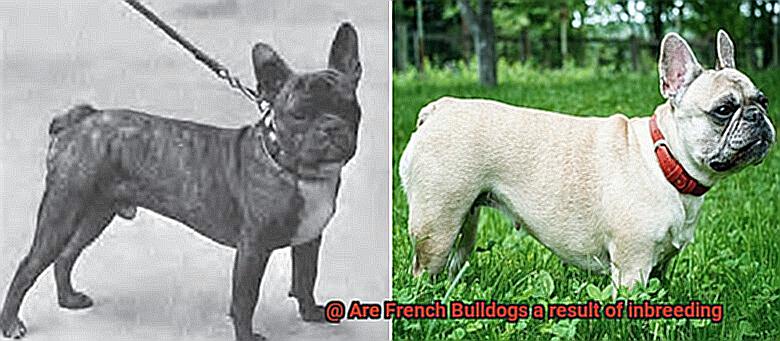
Proper Health Screening: A Fundamental Practice
- Ensure that French Bulldogs are healthy and free from underlying health issues before breeding.
- Regular check-ups with a veterinarian, vaccinations, and preventive measures against common diseases are essential.
- Thoroughly examine the dog’s physical structure to identify any potential structural abnormalities.
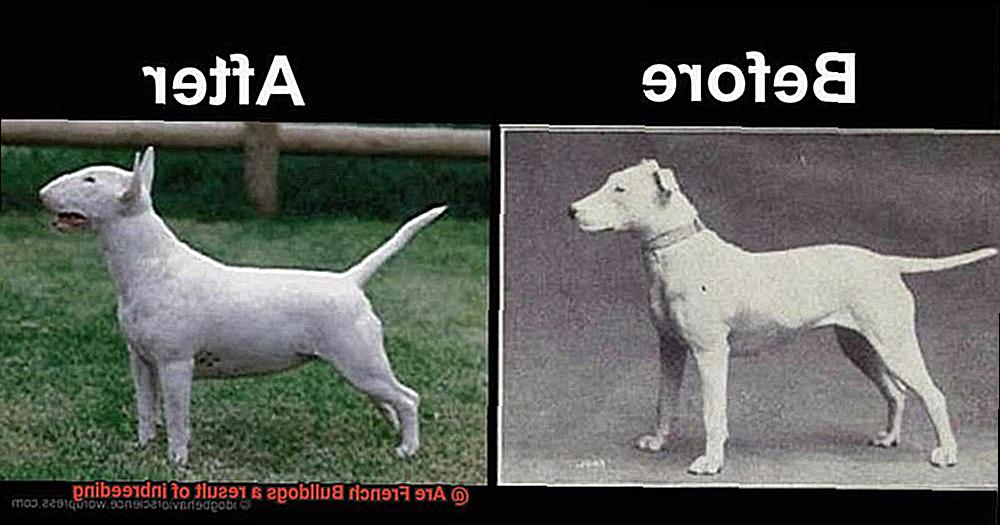
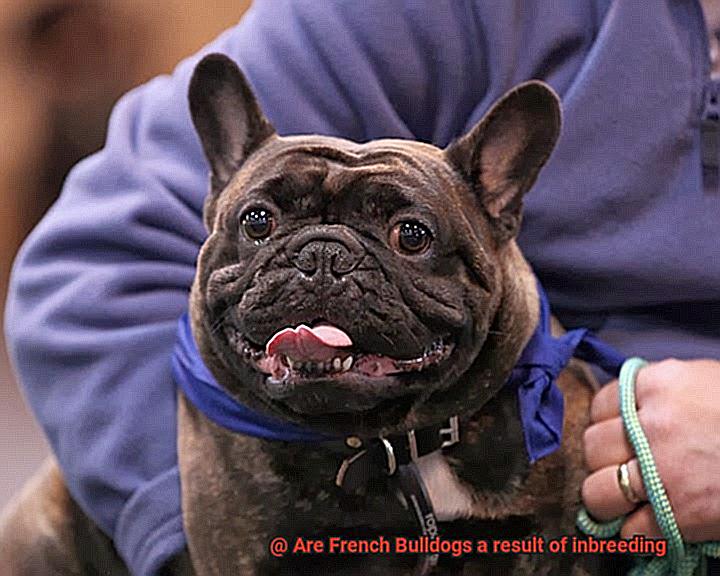
Maintaining Diversity for Optimal Health
- Inbreeding can lead to an increased risk of genetic disorders and reduced overall health in offspring.
- Maintain a diverse gene pool by introducing new bloodlines into breeding programs.
- Collaborate with other reputable breeders or obtain dogs from trusted sources that prioritize genetic diversity.
Welfare and Well-being: A Breeder’s Responsibility
- Provide a suitable environment that meets the physical and psychological needs of French Bulldogs.
- Ensure proper nutrition, regular exercise, socialization, and mental stimulation.
- Avoid overbreeding or harmful breeding practices that compromise the dog’s health.
Finding Suitable Homes: A Lifelong Commitment
- Screen potential owners to ensure they understand the breed’s specific needs and can provide a loving environment.
- Implement policies that require the return of a dog if the owner can no longer care for it, preventing neglectful situations.
The Impact of Excessive Inbreeding on French Bulldog Health
French Bulldogs, with their adorable bat-like ears and playful personalities, have become increasingly popular as family pets. However, behind their charming exterior lies a dark reality – the impact of excessive inbreeding on their health. As an expert in responsible breeding, I want to shed light on this important issue and provide valuable information for French Bulldog owners.
Inbreeding refers to the mating of closely related individuals, such as siblings or parent-offspring. Unfortunately, French Bulldogs have a small gene pool that originated from a limited number of ancestors, making them particularly susceptible to the negative effects of inbreeding. Let’s take a closer look at the impact:
- Brachycephalic Syndrome: One major consequence of excessive inbreeding is the high prevalence of brachycephalic syndrome in French Bulldogs. This condition is characterized by the shortening and narrowing of the skull, which leads to breathing difficulties, snoring, and an increased risk of heat stroke. Imagine trying to catch your breath after a long run – that’s what these poor dogs experience every day.
- Hip Dysplasia: Another common health problem associated with inbreeding is hip dysplasia. This condition occurs when the hip joint does not develop properly and can cause pain and lameness in affected dogs. It’s heartbreaking to see these once-energetic pups struggle to walk or play.
- Eye Problems: French Bulldogs are prone to various eye problems, including cherry eye (prolapse of the third eyelid gland), corneal ulcers, and cataracts. Imagine constantly blinking due to discomfort or struggling with blurry vision – it’s no way for our furry friends to live.
- Skin Issues: Excessive inbreeding also leads to skin issues in French Bulldogs. They are more prone to allergies, dermatitis, and skin infections due to their sensitive skin and compromised immune system. Itchy, irritated skin is not a pleasant experience for anyone, including our four-legged companions.
- Reproductive Problems: French Bulldogs often suffer from reproductive problems due to inbreeding. These include difficulties with mating, birthing complications, and a higher risk of having smaller litters or stillborn puppies. It’s heartbreaking to see these challenges when trying to bring new life into the world.
- Cognitive and Behavioral Issues: The impact of inbreeding on French Bulldog health extends beyond physical ailments. There is evidence suggesting that inbred dogs may have compromised cognitive abilities and behavioral problems compared to their outbred counterparts. It’s like trying to solve a puzzle with missing pieces – frustrating and challenging.

Adopting from Reputable Breeders or Rescue Organizations
When it comes to adopting one of these lovable companions, the decision of whether to adopt from a reputable breeder or a rescue organization can be a tough one. Let’s take a closer look at the advantages and disadvantages of both options.
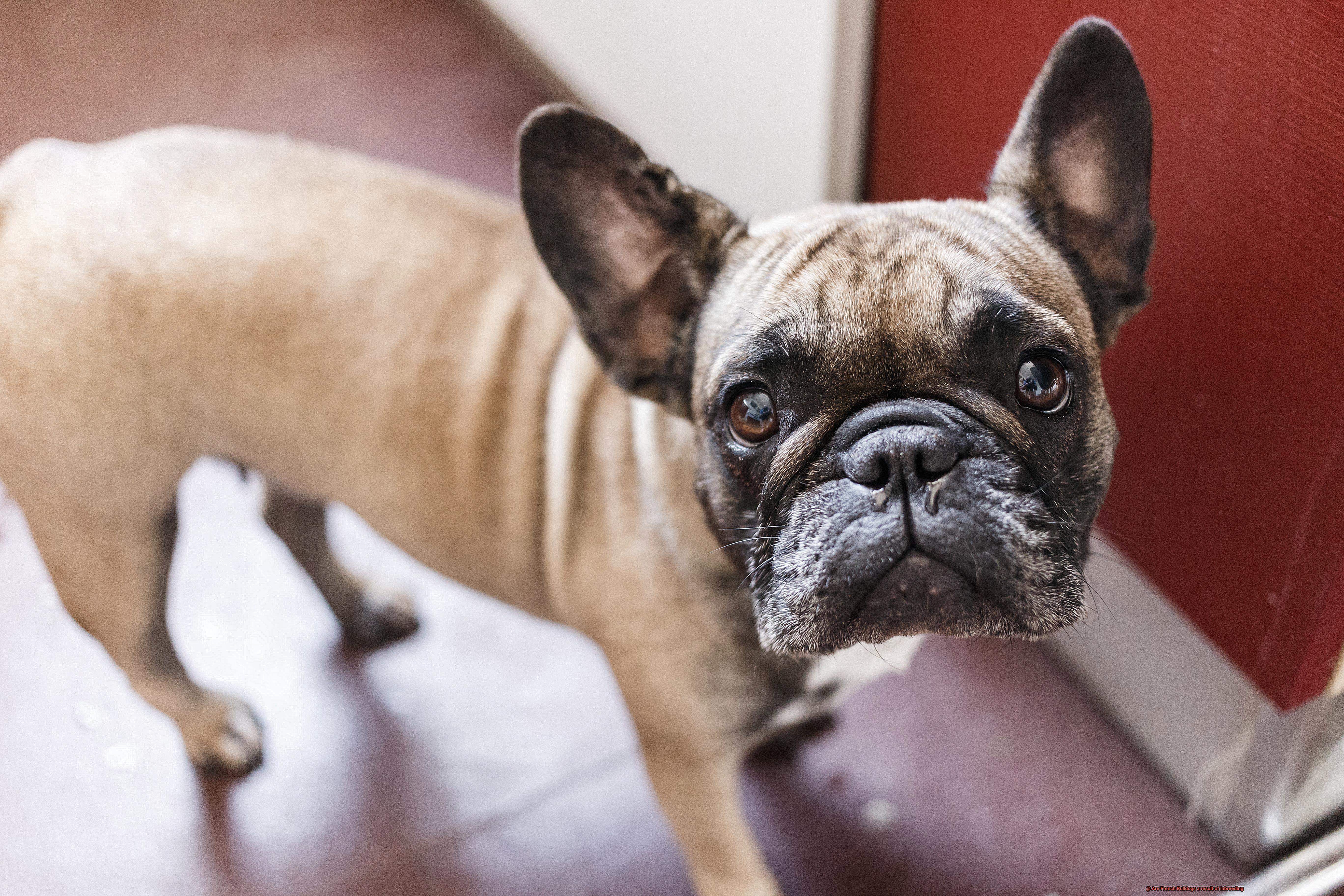
Adopting from a reputable breeder has its perks. These breeders specialize in breeding specific dog breeds, like French Bulldogs, and have extensive knowledge and experience in their field. Here are some advantages:
Advantages of adopting from a reputable breeder:
- Better understanding of the dog’s background: Reputable breeders provide detailed information about the dog’s lineage and health history. This can be crucial in predicting potential health issues or genetic conditions that the dog may be prone to.
- Ethical breeding practices: Reputable breeders prioritize the health and well-being of their dogs over profit. They conduct proper health screenings for their breeding dogs and ensure that they are free from any hereditary diseases common in the breed.
- Ongoing support and guidance: Reputable breeders are invested in the welfare of their dogs and provide continued support to new owners. They offer assistance with training, nutrition, and general care throughout the dog’s life.
On the other hand, adopting from a rescue organization can also be a rewarding experience. These organizations take in abandoned or surrendered French Bulldogs and provide them with temporary shelter until they find a forever home. Here are some advantages:
Advantages of adopting from a rescue organization:
- Giving a second chance: By adopting from a rescue organization, you are giving a second chance to a dog in need. These dogs often come from various backgrounds and deserve a loving home.
- Assessed temperament and health: Rescue organizations assess the temperament and health of the dogs in their care before putting them up for adoption. While the dog’s background may not be as detailed as that provided by a reputable breeder, rescue organizations do their best to provide accurate information about the dog’s behavior and any known health issues.
Of course, both options have their drawbacks as well. When adopting from a reputable breeder, the main disadvantage is the higher cost associated with purchasing a purebred dog. Additionally, there is always a risk of unethical breeders who prioritize profit over the health and well-being of their dogs.
On the other hand, adopting from a rescue organization may come with some challenges. Rescue dogs often come from various backgrounds, and their past experiences may affect their behavior or health. Potential owners should be prepared for the possibility of behavioral or health issues that may require additional care and attention.
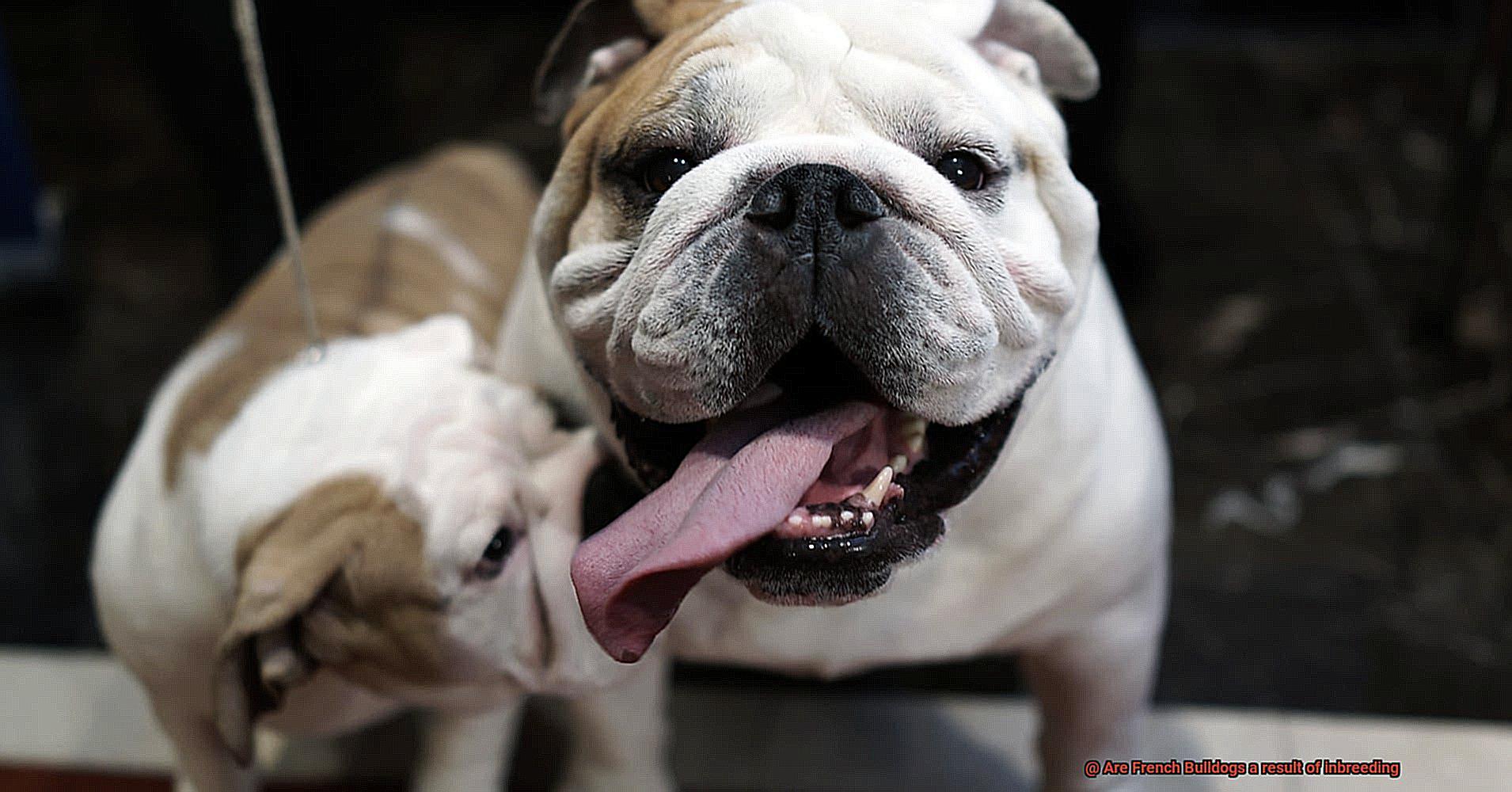
Promoting Responsible Breeding Practices to Improve Genetic Diversity
French Bulldogs are adorable, affectionate, and loyal companions. However, their popularity has led to some negative consequences, such as a decrease in genetic diversity and an increase in inherited diseases. By promoting responsible breeding practices, we can work towards improving the overall health and vitality of French Bulldogs.
Genetic Testing: A Step Towards Responsible Breeding
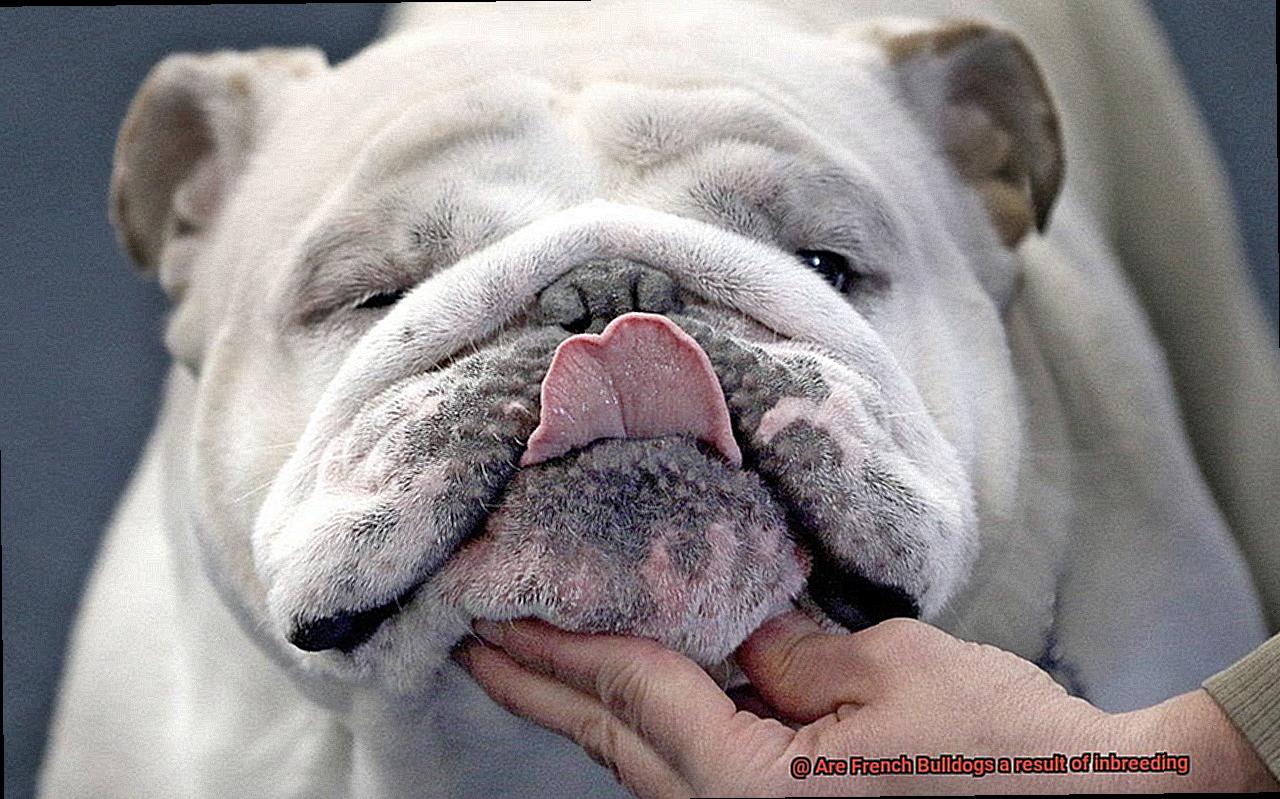
- DNA tests help identify potential genetic disorders or traits that may be passed on to offspring.
- Breeders can make informed decisions about breeding pairs, reducing the risk of inherited diseases.
- Credible sources like the Orthopedic Foundation for Animals (OFA) provide testing guidelines to ensure accuracy.
The Balance of Linebreeding and Outcrossing
- Linebreeding helps preserve desirable traits while minimizing the risk of genetic disorders.
- Excessive linebreeding or inbreeding can increase the likelihood of inherited diseases.
- Outcrossing introduces unrelated individuals to increase genetic diversity but requires careful consideration of health and genetic background.
Prioritizing Overall Health and Well-being
- Breeders should provide proper nutrition, regular veterinary care, exercise, and socialization to maintain the health of breeding dogs.
- Healthy breeding dogs produce healthy offspring and contribute to the genetic diversity of the breed.
Transparency and Openness in Breeding Practices
- Responsible breeders willingly share information about the health and genetic history of their dogs.
- Sharing health test results, pedigrees, and other relevant information helps potential owners make informed decisions.
The Power of Education
- Breed clubs, organizations, and veterinary professionals offer valuable resources and guidance on breeding practices.
- Education empowers breeders to make responsible choices and improve the genetic diversity of French Bulldogs.
Educating Potential Owners about the Health Risks of Inbreeding
These adorable and affectionate dogs have become increasingly popular, but it’s essential to be aware of the health risks associated with their breeding history. In this article, we’ll explore the potential health problems that can arise from inbreeding in French Bulldogs and provide valuable tips for potential owners to make informed decisions.
Understanding Inbreeding and its Purpose:
Inbreeding refers to the mating of closely related individuals within a specific breed. This practice is often used by breeders to maintain certain physical characteristics or traits. While inbreeding has shaped the appearance and temperament of French Bulldogs, it also comes with significant health risks.
Increased Likelihood of Genetic Disorders:
One of the primary concerns with inbreeding is the higher chance of passing on harmful recessive genes that can lead to various health issues in offspring. French Bulldogs are prone to several inherited conditions, including respiratory issues, allergies, eye disorders, skin problems, and musculoskeletal abnormalities.
Brachycephalic Syndrome:
French Bulldogs are known for their flat faces and shortened skull shape, which is a result of their breeding practices. However, this can lead to a condition called brachycephalic syndrome. It causes severe breathing difficulties, heat intolerance, and exercise intolerance.
Compromised Immune Systems:
Due to the limited gene pool resulting from repeated inbreeding, French Bulldogs may have compromised immune systems. This makes them more susceptible to infections and other immune-related conditions.

Reduced Lifespan and Overall Poor Health:
Inbred dogs generally have a reduced lifespan and are more vulnerable to overall poor health compared to outbred dogs. The accumulation of genetic defects over generations can significantly impact the well-being of French Bulldogs.
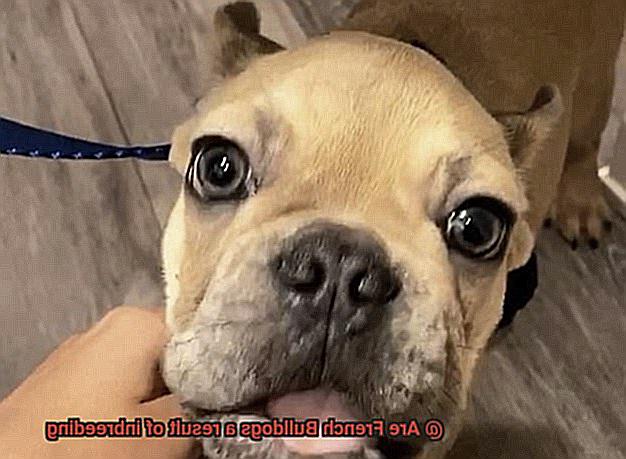
Tips for Potential Owners:
- Research Responsible Breeders: Look for breeders who prioritize the health and well-being of their dogs. Ask about health test results, pedigrees, and the breeder’s knowledge of genetic disorders.
- Consider Mixed-Breed Dogs: Adopting a mixed-breed dog can offer a healthier genetic background and reduce the risk of inherited diseases.
- Explore Other Breeds: If you’re set on a specific appearance or temperament but concerned about health risks, consider exploring other breeds with a healthier genetic background.
lyiY8Comz8s” >
Conclusion
French Bulldogs have long been a beloved breed, known for their distinctive appearance and friendly nature. However, there has been much debate surrounding the origins of these adorable dogs. Many people wonder if they are a result of inbreeding, a practice that involves mating closely related individuals to maintain specific traits.
The truth is that French Bulldogs do have a history of inbreeding. This can be traced back to their early development in the 1800s when breeders were focused on creating a smaller version of the English Bulldog. In order to achieve this goal, they resorted to breeding close relatives, resulting in a limited gene pool.
This inbreeding led to certain health issues that are now commonly associated with French Bulldogs. These include respiratory problems, eye conditions, and joint disorders. While not all French Bulldogs will experience these issues, it is important for potential owners to be aware of the risks.
However, it’s worth noting that responsible breeders today are working hard to address these concerns. They are implementing careful breeding practices and genetic testing to minimize the risk of inherited health problems. By diversifying the gene pool and prioritizing the well-being of their dogs, they aim to create healthier French Bulldogs for future generations.
In conclusion, while French Bulldogs may have originated from inbreeding practices in the past, efforts are being made by responsible breeders to ensure the overall health and well-being of these beloved dogs.
